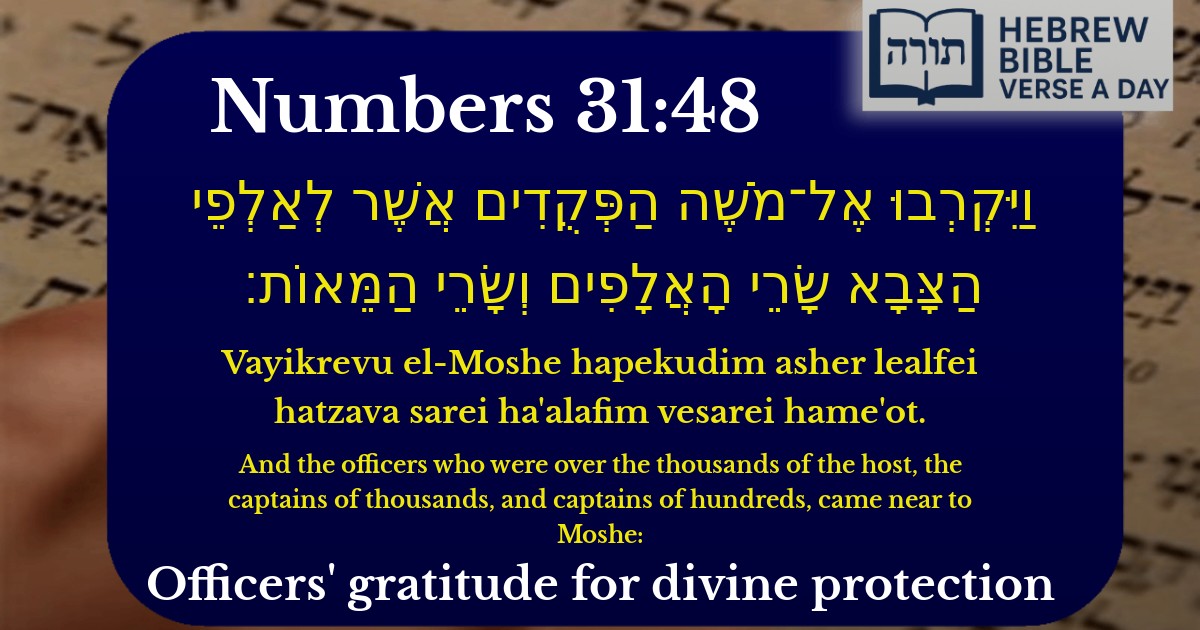Join Our Newsletter To Be Informed When New Videos Are Posted
Join the thousands of fellow Studends who rely on our videos to learn how to read the bible in Hebrew for free!
Hebrew Text
וַיִּקְרְבוּ אֶל־מֹשֶׁה הַפְּקֻדִים אֲשֶׁר לְאַלְפֵי הַצָּבָא שָׂרֵי הָאֲלָפִים וְשָׂרֵי הַמֵּאוֹת׃
English Translation
And the officers who were over the thousands of the host, the captains of thousands, and captains of hundreds, came near to Moshe:
Transliteration
Vayikrevu el-Moshe hapekudim asher lealfei hatzava sarei ha'alafim vesarei hame'ot.
Hebrew Leining Text
וַֽיִּקְרְבוּ֙ אֶל־מֹשֶׁ֔ה הַפְּקֻדִ֕ים אֲשֶׁ֖ר לְאַלְפֵ֣י הַצָּבָ֑א שָׂרֵ֥י הָאֲלָפִ֖ים וְשָׂרֵ֥י הַמֵּאֽוֹת׃
וַֽיִּקְרְבוּ֙ אֶל־מֹשֶׁ֔ה הַפְּקֻדִ֕ים אֲשֶׁ֖ר לְאַלְפֵ֣י הַצָּבָ֑א שָׂרֵ֥י הָאֲלָפִ֖ים וְשָׂרֵ֥י הַמֵּאֽוֹת׃
🎵 Listen to leining
Parasha Commentary
📚 Talmud Citations
This verse is not quoted in the Talmud.


Context in the Torah
The verse appears in Bamidbar (Numbers) 31:14, describing the approach of the military officers to Moshe after the battle against Midian. This occurs following the command to wage war as retribution for Midian's role in leading Bnei Yisrael astray through the incident of Baal Peor (Bamidbar 25:1-9).
Rashi's Explanation
Rashi (31:14) notes that these officers came to Moshe with a halachic inquiry regarding the spoils of war. They questioned whether the gold and silver captured from Midian—which had been used for idolatry—was permitted for Jewish use or if it fell under the prohibition of "issur hana'ah" (benefit from idolatrous items). This demonstrates their meticulousness in observing Torah law even in wartime.
Military Structure and Leadership
The verse emphasizes the hierarchy of the Israelite army:
The Rambam (Hilchot Melachim 4:1) later codifies this structure as the ideal model for Jewish military organization, reflecting both efficiency and decentralized leadership.
Midrashic Insight
The Midrash Tanchuma (Matot 3) highlights the officers' humility in approaching Moshe despite their high rank. Unlike other nations where military leaders might act independently, these officers recognized Moshe's supreme authority in both spiritual and military matters. This reinforces the Torah ideal that even in war, Jewish leaders remain subservient to Torah law.
Halachic Implications
The Chizkuni (31:14) observes that the officers' approach to Moshe sets a precedent for seeking rabbinic guidance in complex situations—especially those involving potential conflicts between military necessity and halachic observance. This principle remains foundational in Jewish military ethics (hilchot tzava) to this day.